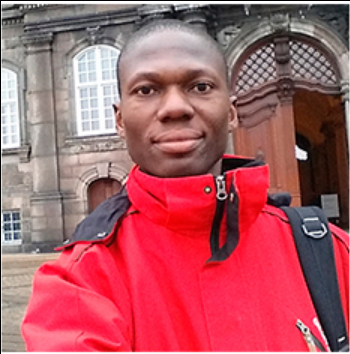Theodore from Ghana, Special Needs Pedagogy

Subject: Special Needs Pedagogy
Education institution: UCC International
Age: 32
Country: Ghana
Scholarship: Exchange student
Bringing Nordic educational theory back to Ghana
"I have learned to use outdoor activities, games and physical movement to help children in their development. I can use that working with children whether they have disabilities or not." Theodore Amevor (32), who studies special needs pedagogy in Ghana in West Africa, has spent a semester at the professional college UCC in Copenhagen.
It was Theodore Amevor's first trip to Europe when he came to Denmark in the fall semester of 2015 to follow an international course at the professional college UCC in Copenhagen. Ordinarily, he studies special needs pedagogy (Special Education) at The University of Education in the city of Winneba on the south coast of Ghana. Winneba is about 60 kilometres from the capital of Accra–and 5,700 kilometres from the Danish capital Copenhagen. He has returned to Ghana with many good experiences.
"I was able to come to Denmark as an exchange student, because my university has an exchange programme with the professional college UCC, and I have really enjoyed studying in Denmark. While in Denmark, I realized that the country is a very safe and clean place to live–with lots of nice people and many interesting places to visit. Places like Amalienborg Castle, the Parliament at Christiansborg and the waterfront area of Nyhavn–to name just a few. It is nice that it is so easy to get back and forth by bike, bus or train," says Theodore Amevor (32).
Fellow students from many countries
He followed the course "Childhood in a Nordic Perspective" along with students from Denmark, Norway, Iceland, Belgium and Spain. The course introduces the students to a Nordic perspective on childhood, the Nordic welfare model and learning based on play and physical movement, in nature as well as in urban outdoors environments. The course is organised in cooperation with Oslo and Akerhus University College of Applied Sciences (HiOA) in Norway.
"I really like the format of the course, which is mixture of theory, practice and fieldwork. We also went on a study trip to Norway where we learned about outdoors life, went hiking, slept outdoors, stayed in a cabin in the woods and visited the city of Oslo and the islands in the fiord," says Theodore Amevor, who gained many new friends during the four months he spent in Denmark.
Outdoors activities strengthen children's development
Theodore Amevor has brought inspiration and new educational tools back to Ghana. These are tools he can clearly use in his studies for a bachelor's degree, which he expects to complete in the spring of 2016, and in his coming job.
"As a special educator, I can use my new knowledge to plan and organise activities in nature and outdoors for children with and without special needs. I want to use the materials available in the surroundings to help children in their physical, psychological, cognitive and social development. So they are able to do well socially and get an education," says Theodore Amevor.
Danish and Ghanaian pedagogy go together
There is a difference between educational practices in Ghana and Denmark, he explains. Danish children are often allowed to play freely and take part in the decision on what to do–as opposed to children in Ghana. Outdoor kindergartens where children spend almost the whole day outside in all kinds of weather are far from common in Ghana.
"In Ghana, children are not allowed to handle sharp objects or climb in trees, unlike the situation in some Danish kindergartens," says Theodore Amevor. He has been very happy to be able to discuss pedagogy and educational methods with fellow students from many countries.
"We shared a lot of experiences from our native countries and talked about the differences between the educational practices in Ghana, Denmark and other countries like Iceland, Spain, Norway and Belgium, and we showed each other the games that are most common in our respective native countries. We realized that factors such as environment, politics and parental expectations have major influence on the educational practice in a given country. But if you have knowledge of the practices in different countries, you can mix the various ideas and adapt the methods to your own environment and thereby help children get the best possible basis for development," says Theodore Amevor.

